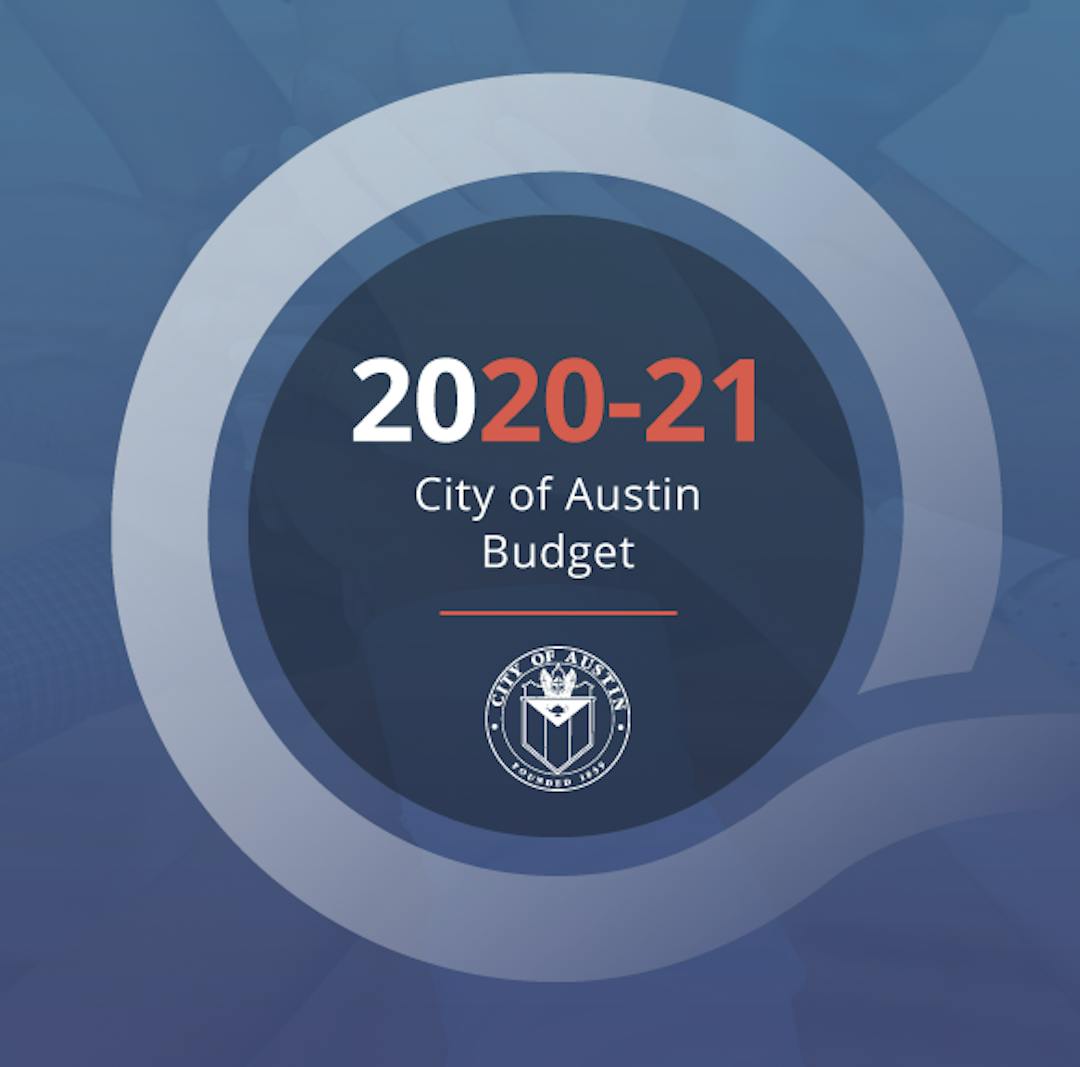2021 Budget Engagement
Consultation has concluded

WELCOME TO THE CITY OF AUSTIN 2021 BUDGET ENGAGEMENT!
The City is committed to an inclusive and transparent budget development process that utilizes resident and stakeholder feedback to ensure budget priorities are being met.
During the months of January and February, 9 Community Meetings were hosted by each of the nine commissions that make up the Joint Inclusion Committee or a City Council Town Hall. All dates and times held are listed below.
On July 13, 2020, Austin City Manager Spencer Cronk presented his proposed Fiscal Year 2020-2021 budget to City Council. Via videoconference, Cronk laid out the highlights and key themes of his proposals for City tax and spending for the fiscal year beginning October 1, 2020.
Austin City Council Approves FY 2020-2021 Budget:
The Austin City Council passed a $4.2 billion budget for the next fiscal year, which begins October 1. The approved budget adjusts to new fiscal constraints and community expectations, with focused investments in core programs and City infrastructure. As detailed in the press release HERE, the budget process included unprecedented levels of community input. Council began deliberations working from the City Manager’s proposed budget, which included the following commitments, now part of the adopted budget:
- $60.9 million to strengthen the City’s commitment to end homelessness in Austin through housing displacement prevention, crisis mitigation, and re- empowerment efforts
- Additional $3.5 million in low interest loans to small businesses through the Family Business Loan Program
- $735,000 to enhance the City’s open-data portal, increasing transparency for Austin residents
- $1.5 million for improvements to the Asian American Resource Center, Carver Museum, and Mexican American Cultural Center
- $423,000 and 6 new positions to fully implement the citywide curbside organic materials collection program
- $14.7 million for sidewalk improvements and $2.3 million for pedestrian safety including hybrid beacons, audible crosswalk indicators, and more visible signs and markings
- $5.1 million for crisis response and victim services
In addition to approving these investments, City Council moved to introduce changes to public safety in Austin. The adopted budget will:
- Reduce Austin Police Department (APD) funding by approximately $20 million – taken primarily from cadet classes and overtime – to reinvest in permanent supportive housing and services, EMS for COVID-19 response, family violence shelter and protection, violence prevention, workforce development, and a range of other programs.
- Move a number of APD functions (and related funding of nearly $80 million) out of APD over the course of the fiscal year. These include Forensics Sciences, Communications/911 call center, strategic support, and internal affairs.
- Create a Reimagine Safety Fund to divert almost $50 million from APD toward alternative forms of public safety and community support, to be delivered from outside APD, as determined through the year-long reimagining process.
The approved budget assumes a property tax rate of 53.35 cents per $100 of taxable value. Council ordered a November 3 election to seek voter approval for the additional taxes to fund Project Connect. If voters accept the proposed tax rate of 53.35 cents in November the City tax bill for the typical homeowner. Under the adopted budget, typical rate payers will see their Austin Energy bills go down and their Austin Water bills frozen. Austin Resource Recovery charges will increase, by just over $31 per year, to pay for the citywide implementation of curbside organic materials collection. Taken together, the combined impact of tax, rate and fee changes would represent an increase, for the typical ratepayer, of 7.9% - an additional $325.20 per year or $27.10 per month.
FY21 Budget Survey Final Report:
The Budget Office partnered with the Stanford Crowdsourced Democracy Team to develop an online budget priority survey that sought resident input on general fund revenues and allocation of funding amongst general fund services.
Click HERE to view the Budget Priorities Survey Final Results.
FY21 Boards and Commissions Recommendations:
As always, there was significant amount of engagement with the City’s boards and commissions this year starting with nine community budget forums hosted by the commissions comprising the Joint Inclusion Committee. Resident input collected by the commissions at these forums guided the development of their
respective budget recommendations.
Click HERE to view the Boards and Commissions recommendations.
City Council Town Halls:
To view the Virtual Town Hall Budget Presentation, click HERE.
City Council District 5
Monday, June 1st, WebEx Video Conference, 5:00pm
City Council District 10
Wednesday, June 3rd, WebEx Video Conference, 6:00pm
City Council District 8
Thursday, July 16th, WebEx Video Conference, 6:00pm
City Council District 7
Monday, July 20th, WebEx Video Conference, 6:00pm
City Council District 2
Tuesday, July 21st, WebEx Video Conference, 6:00pm
City Council District 6
Monday, July 27th, WebEx Video Conference, 6:00pm
City Council District 1
Sunday, August 1st, Facebook Live, 4:00pm
City Council District 9
Thursday, August 6th, WebEx Video Conference, 6:00pm
Community Meetings:
LGBTQ Quality of Life Advisory Commission
Saturday, January 11th, City Hall, 1pm
Hispanic/Latino Quality of Life Resource Advisory Commission
Saturday, January 25th, South Austin Recreation Center, 10am
African American Resource Advisory Commission
Tuesday, January 28th, Millennium Youth Entertainment Center, 6:30pm
Commission on Seniors
Tuesday, February 4th, Gus Garcia Recreation Center, 1pm
Commission for Women
Wednesday, February 5th, City Hall, 6pm
Mayor's Committee for People with Disabilities
Friday, February 7th, City Hall, 5pm
Asian American Quality of Life Advisory Commission
Thursday, February 13th, Asian American Resource Center, 6:30pm
Commission on Immigrant Affairs
Saturday, February 22nd, Asian American Resource Center, 2pm
Human Rights Commission
Monday, February 24th, Learning Research Center, 5:30pm





